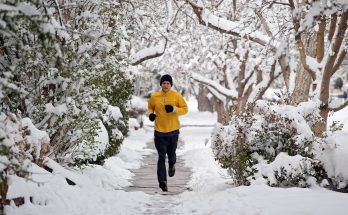Winters pose a unique set of health problems. Although winter can be a pleasant time to spend at home and outdoors, some may vouch otherwise. People with joint pains and asthma usually feel the bunt with the onset of winters. It can also pose challenging health issues in the age group of infants and elderly.
Six of the common health issues encountered in the winters are listed below with a brief overview on how to tackle them.
1. Bronchial Asthma
Asthma is characterized by reversible obstruction of the airway in lungs. The lungs are hyper-reactive in this condition and it is triggered by a number of factors – like pollen, dust, cold air, physical exertion. The person usually gets breathless during an attack of asthma and is gasping for air.
In the winters try to avoid going out in extremely cold weather. If going out, cover the nose and wear adequate winter clothing/sweater to protect from cold air. Always carry your Asthma inhaler (like Salbutamol inhaler) along with you at all the time. Make sure the inhaler is filled.
2. Common cold
Common cold or ‘viral rhinitis’ as it is called is caused by a virus. The virus infects the nasal and throat lining. The usual presentation is running nose, dry cough and gritty feeling at the back of throat/throat ache.
Not that the virus spreads more easily in cold weather, but because of cold air, the nasal and oral secretions dry up. These secretions normally act as a protective layer providing local immunity against germs and viruses. Because of this dryness, the virus clings on to the lining and causes infection.
With the start of winter, try to avoid having anything cold like cold water.

On the slightest feeling of throat ache, do warm water gargles three to four times a day. Add a little salt to the warm water for gargling. Steam inhalation two to three times a day also helps. Oral intake of multivitamins is also good in this condition. Maintain a good diet and have sufficient oral water/fluid intake. Washing hands regularly especially after sneezing/coughing helps restrict the spread of the virus.
3. Arthritis
People who suffer from arthritis/joint pain notice an increase in frequency and intensity of joint pains during winters. The exact mechanism for this is not known, however, it can be aggravated due to spasm of muscles and inflammatory changes in the joint fluid.
In winters, try to do adequate warm up before performing any exercises. Regular physical activity and exercise help prevent joint pain. Use adequate winter clothing while outdoors especially covering extremities. When having joint pains, regular applications of warm water fomentation and over the counter pain relief ointments are helpful.
4. Heart attack
Heart attack or ‘myocardial infarction’ is caused due to the relative inadequate blood supply to the heart muscle with respect to its need. In cold weather usually there occurs constriction (narrowing) of blood vessels to maintain temperature regulation. Hence the heart has to function more vigorously to maintain blood supply to all the organs and extremities. This causes a mismatch between the oxygen supplied to the heart muscle as compared to its demand and increases the chances of heart attack.

Wear adequate clothing to cover extremities and head. Make use of multiply layered clothing. Maintain regular healthy diet and lifestyle with regular exercise. Avoid/quit smoking to decrease the harmful effect on heart vessels. In case of any of the warning signs of heart attack (chest pain usually on the left side of chest, palpitation, sweating, pain radiating to left arm) do visit and consult a doctor immediately.
5. Dry Skin
Winters dry the skin. Sweating occurs less frequently in winters to maintain temperature regulation. Dehydration worsens this scenario as we tend to drink less water and fluids in winter.
Have a good oral fluid intake during the cold season. Take adequate sleep at night. Cover the body adequately especially head and feet. Regular use of a good moisturizer is required to combat the problem of dry skin. Intake of sufficient amount of fruits in the diet also helps.

6. Depression
Depression or ‘Seasonal Affective Disorder’ is also a common thing felt by people in the winters. Well, the exact cause is not completely known, but it is hypothesized due to chemical/serotonin imbalance in the nerve junctions of the brain caused due to decreased exposure to sunlight and daylight hours.
To beat the depression, try to spend more hours outdoors in the day under sunlight with an adequate cover of winter clothes. Regular exercise and intake of a healthy diet of vegetables and fruits help. Adequate sleep at night is also necessary to combat depression.




